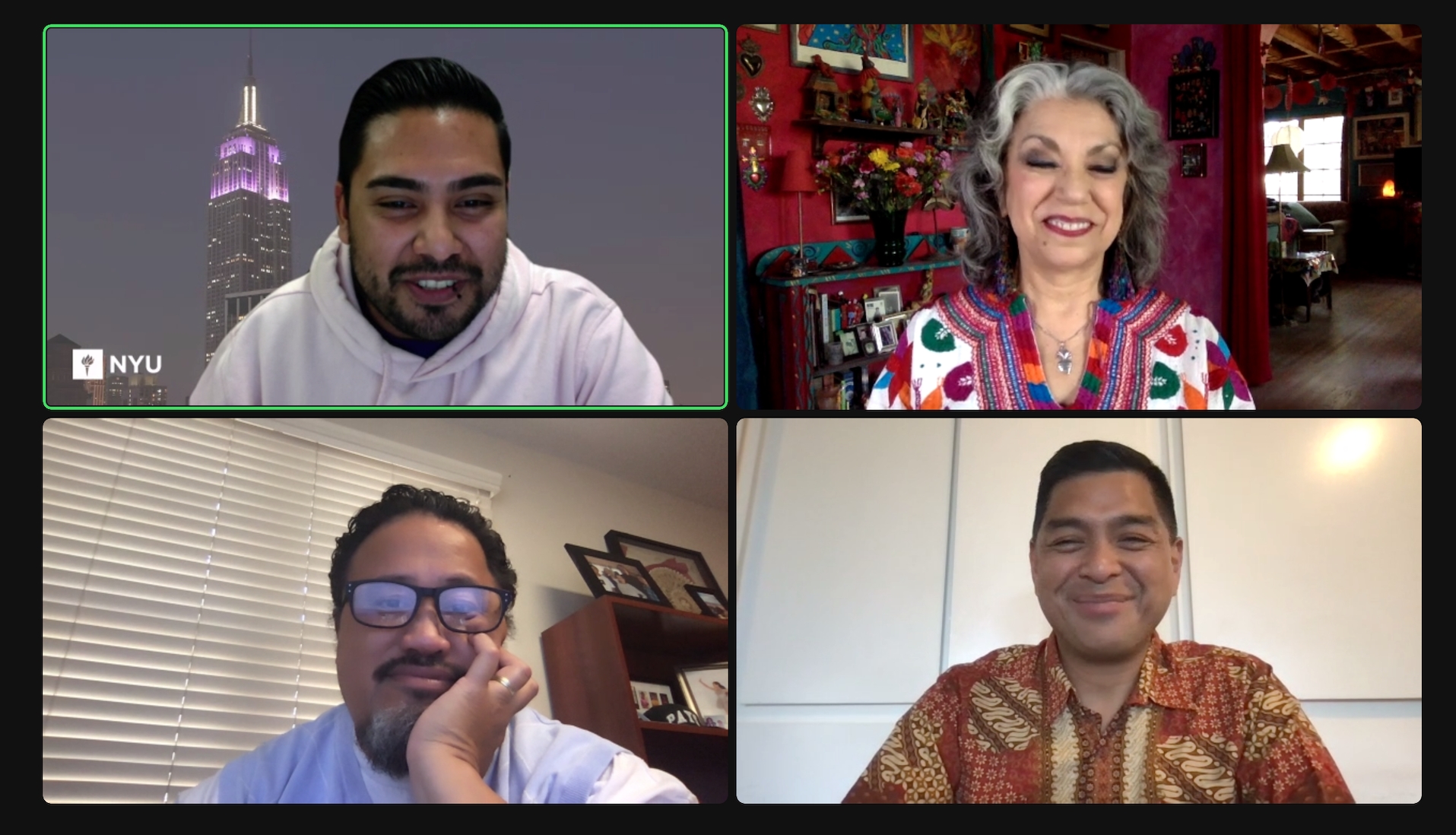On the evening of Monday, March 21st, MA Graduate Assistant and Performance Studies MA Candidate, Andres Fluffy Aguilar, introduced the Department of Performance Studies’s second Spring Lecture Series titled “Activating Communities in Performance,” featuring Rose Portillo, Giovanni Ortega, and Sefa Aina. The evening was filled with joy, laughter, heartfelt messages, and reminders of what Black, Indigenous, and People of Color (BIPOC) students, staff, and faculty must endure in spaces of higher education.
As our evening began, our panelists were asked “How do you activate your communities through your own disciplines and/or positions?” Sefa responded with a Samoan proverb “the path to leadership is through service.” Sefa’s response attributed his “activation” of communities through service - being in spaces where he can externalize his energy and think about others in the work that he does. In a different manner, Rose specified, “Becoming a professional taught me I was very different from my white colleagues and friends, and that I had to work differently, and I had to bring experience to people that looked like me and I had to tell a story about people that looked like me.” Rose’s “activation” of her community uses her platform (as an educator and actor) to share stories of historically marginalized identities that she embodies - once again thinking of others in the work that she does. Giovanni laughingly stated, “I entertain, I engage, and I IN-TERRO-GATE!” He explained how he has a tendency of going into spaces he’s not “allowed” to be in; however, he stays attuned to the silenced voices that fill those spaces and reminds himself that he deserves to be there and all kinds of space in all parts of the world - it’s about listening - listening to the whispers that “activate” the spaces that one encounters.
Our panelists attributed that before one can serve their community, one must understand who they are and be present. In another Samoan proverb, Sefa stated “ in the journey to where we have arrived today, we rest under many trees.” This metaphorical resting spot allowed us to reflect on those that came before us - our ancestors and elders - who have aided the construction of these paths. Additionally, Rose mentioned the “House of spirits” and the need for awareness of the energy of the places that we rest, reside, work, and live. Her attribution to the House of Spirits allowed us to think and acknowledge the land that we occupy. Lastly, Giovanni remarked “I am here today because of the people who gave me the power and the encouragement to fail and fly.” His remarks coincided with both Sefa’s and Rose’s contribution to the conversation of being present, here and now, and activating those communities to soar into new heights.
Through our conversation, Sefa reminded us that BIPOC students, staff, and faculty always find themselves performing all the time in spaces of higher education - performing being okay, performing being smart enough. Sefa’s mediation in this conundrum is providing spaces where one can just be who they are. He recalled hearing from Patricia Collins, “Our job is to create the conditions that make the world possible.” With that, if he (Sefa) can create certain conditions (and spaces), then they (students, staff and faculty) can get their work done. It is with “loving eyes” from our ancestors, elders, mentors, friends, parents, etc. that reminds us of why we are present, in the here and now, and the essential work of activating our communities.
In activating our ancestors, elders, communities and past, we were left with ourselves - how do we bring ourselves (our identities) into these spaces of performance? “Authentically.” And while “authenticity” is politically charged, our panelists reminded us of bringing our authentic selves into spaces. While this act of bringing our authentic selves is challenging, it is a call to action to find spaces, specifically in higher education institutions, to simply be (and not perform).
In a joyous and inspirational conversation, our panelists virtually hugged all of our participants as a gentle reminder that we all need to find spaces to simply be ourselves. Rose reminded us that “joy is a revolutionary act” and our collective joy, in being ourselves, is revolutionary. Our revolutionary acts of activating our communities, especially our BIPOC communities, is about embracing our ancestors, elders, and communities - paying it forward with creating the conditions to make the world a more inclusive, accepting place for us to live and be.
Story by Fluffy Andres Aguilar.
